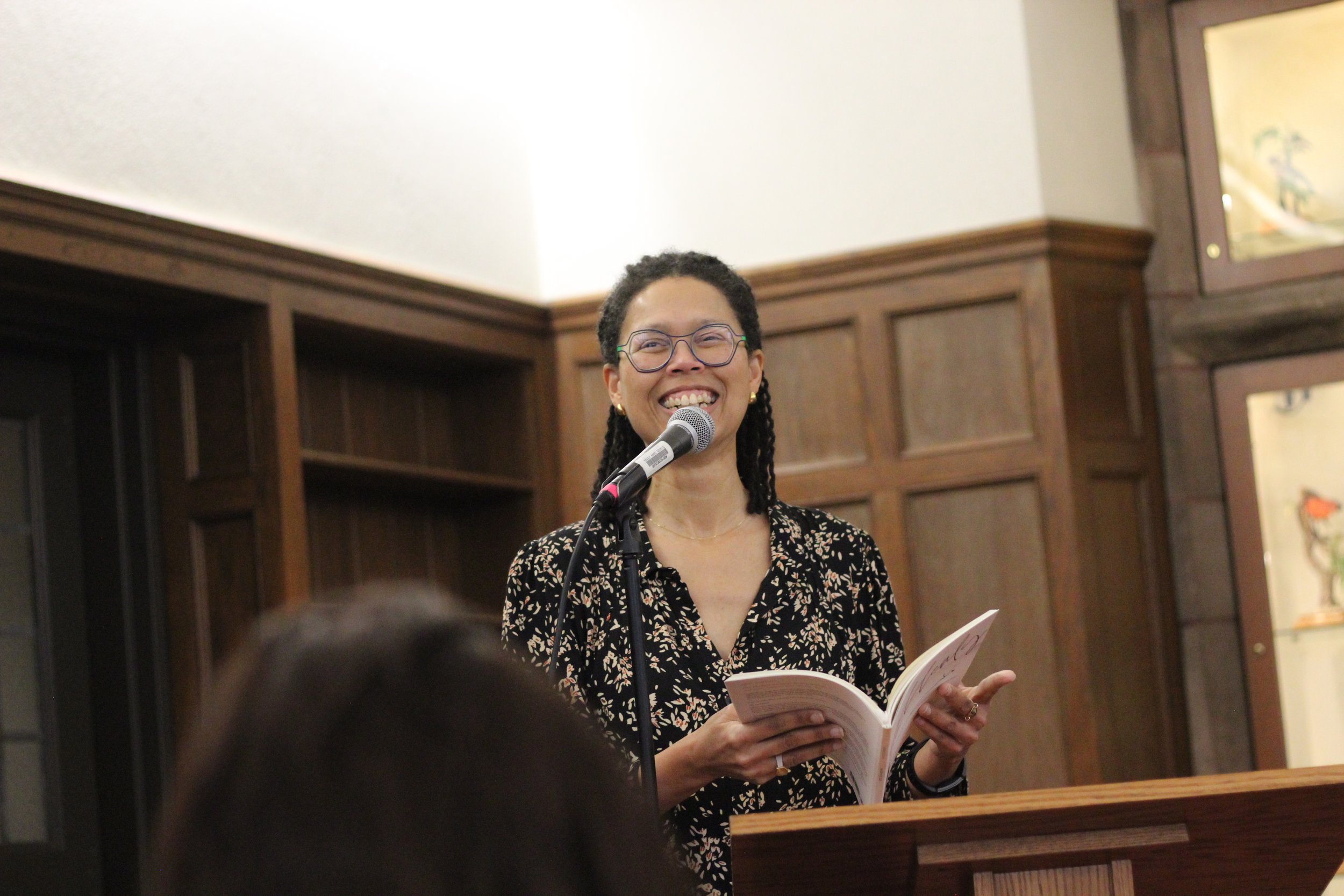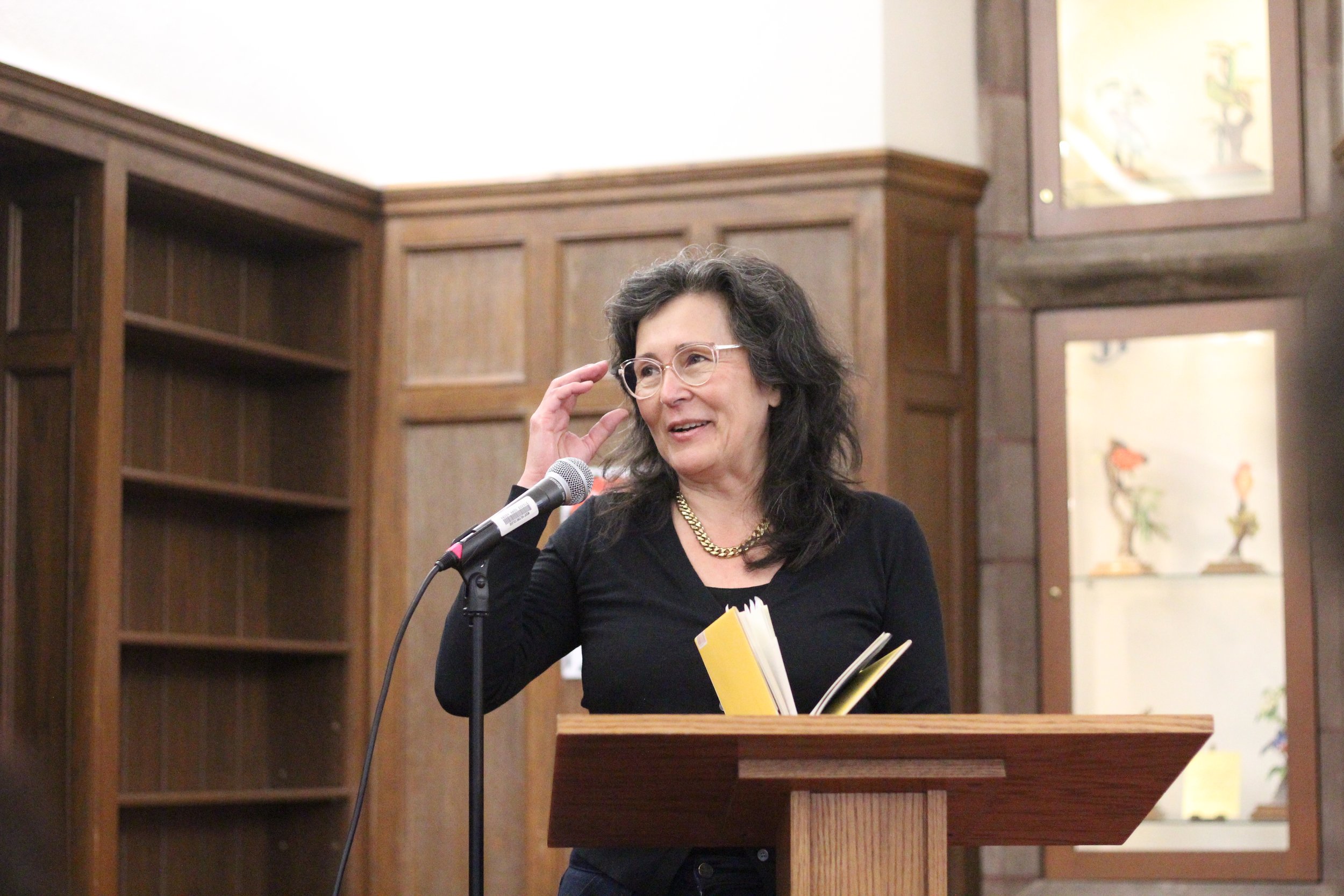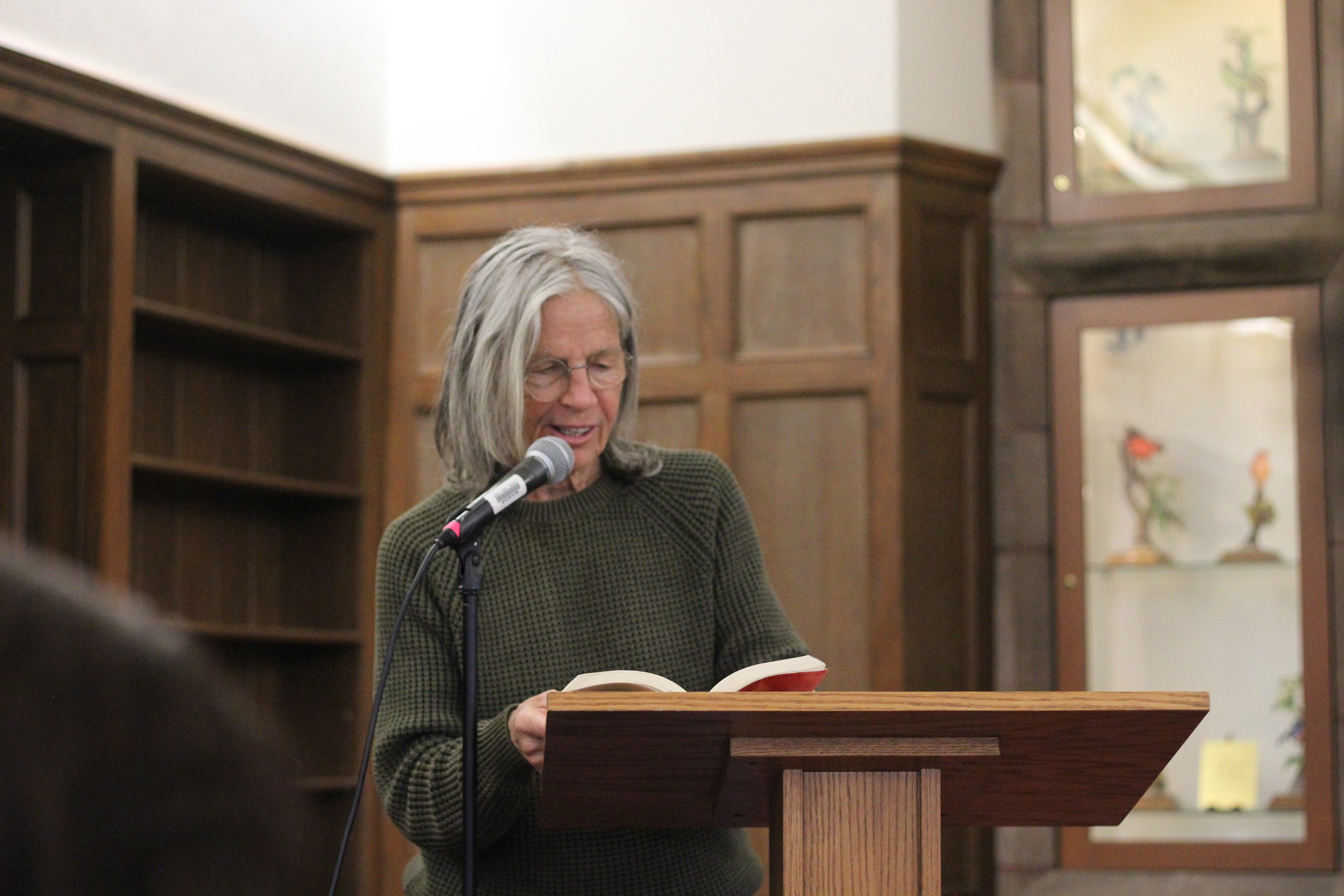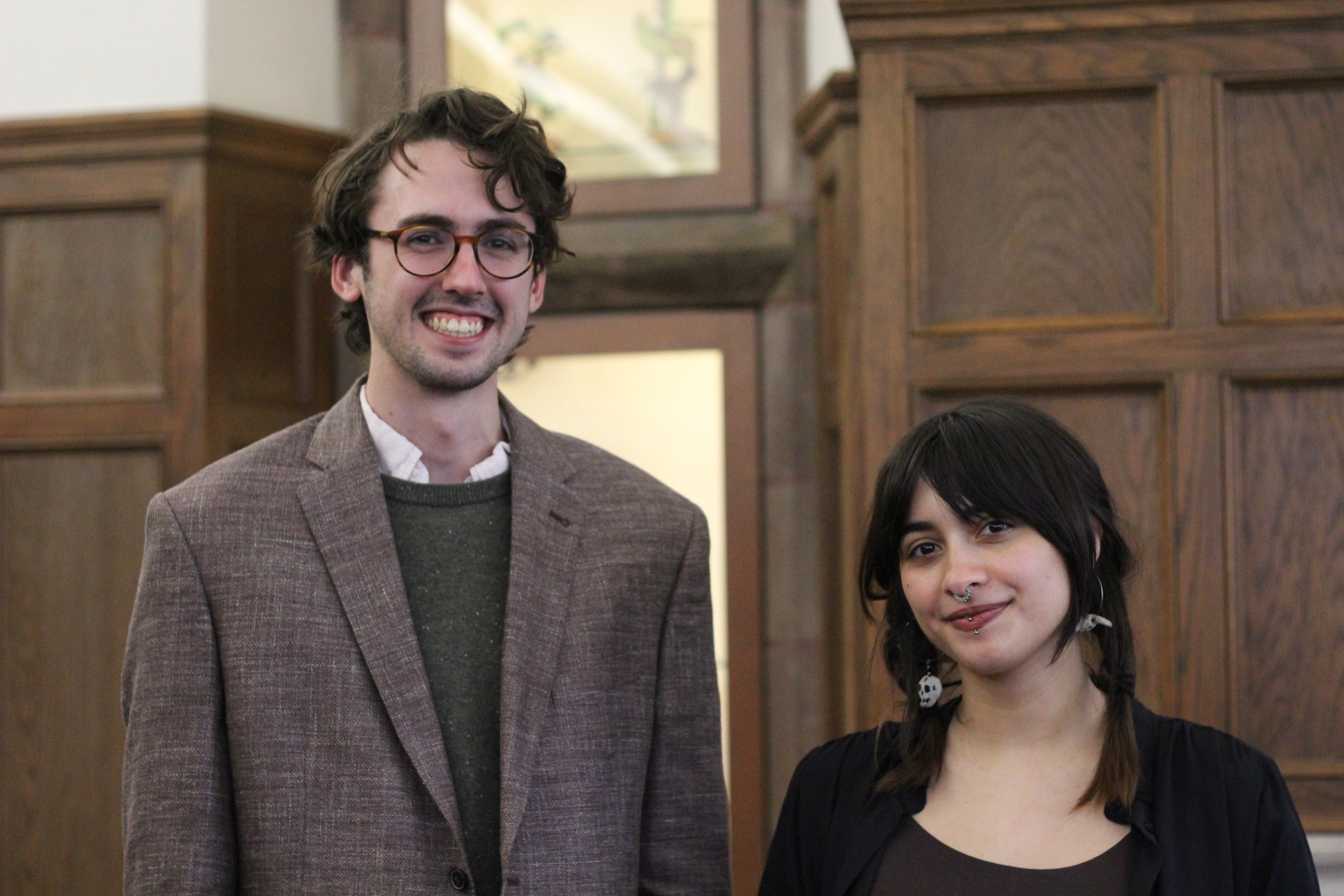



Photos by Ali Meizels ’23.
From left to right: Tom Bosworth and Portlyn Houghton-Harjo split the prize at the 100th Glascock contest; Eileen Myles, Hoa Nguyen and Evie Shockley all read from their latest books of poetry at the judge’s reading on the morning of Sat., April 1.
By Jesse Hausknecht-Brown ’25
Managing Editor of Layout & Features Editor
Content warning: this article mentions anti-Black violence.
Over the last 100 years, the Mount Holyoke College English department has invited college-aged poets and professional poet judges to the College to participate in the Glascock poetry contest. This year the judges — poets Hoa Ngyuen, Eileen Myles and Evie Shockley — split the prize and awarded it to Dartmouth College senior Tom Bosworth and Pratt Institute senior Portlyn Houghton-Harjo.
The contest is named after Kathryn Irene Glascock, a student of the Mount Holyoke class of 1922, who died shortly after graduating. Glascock had been a promising poet and the editor-in-chief of the Mount Holyoke News; her parents gave a donation to the English department as a memorial to their daughter. The chair of the English department at the time, Ada Snell, used this to create the Glascock poetry contest. The following year, in 1924, Snell invited contestants from other colleges, making this year’s Glascock contest the 99th intercollegiate event.
Former judges include Robert Frost, Adrienne Rich, William Carlos Williams and Audre Lorde. Sylvia Plath, James Merrill, Anthony Hecht and Robert Lowell all competed in the contest as students.
The first event of the weekend was a conversation with the judges on the morning of Friday, March 31. Lucas de Lima, a poet and visiting lecturer in the English department, mediated a conversation with the judges and opened the discussion for audience questions near the end of the hour. The event took place in the Stimson Room in the Williston Memorial Library which had been rearranged so that there were rows of chairs facing the front, where the judges sat.
This year’s contestants — Bosworth, Houghton-Harjo, Mount Holyoke College’s Ace Chandler FP ’26, University of Massachusetts Boston junior Elizabeth Roa Martinez, Suffolk University senior Mason Newbury and Amherst College junior Jordan Trice — were seated in the front row.
“I liked how open the dialogue was and the mindfulness of the judges,” Olive Xia ’26 said about the judge’s conversation. “Their answers were all very well thought out and very nuanced. I loved how Eileen Myles answered the questions about poetic voice and gender.”
The competition itself took place in Gamble Auditorium on the evening of March 31, where the contestants read their poetry. In the lobby outside of Gamble Auditorium, free copies of Joyce Horner’s poetry book “Flag and Feather” were handed out as well as five different zines about the history of the Glascock poetry contest, made by students in Assistant Professor of English Anna Maria Hong’s archive’s class. The Joyce Horner Poetry Prize is one of the sponsors of the event, along with the Kathryn Irene Glascock Memorial Fund, the Charles and Rosanna Batchelor Memorial Fund, the InterArts Council and the College’s English department. Attendees also received a pamphlet with each of the contestant’s poems printed inside.
Interim President Dr. Beverly Daniel Tatum gave opening remarks and provided a short history of the Glascock poetry contest. Shortly thereafter, the contestants, each of whom was introduced by a student member of the Glascock committee, performed their poetry.
“The reading had a great vibe, a lot of people showed up. … I felt like people were really excited to be there and to hear the contestants’ work and everyone was super respectful,” Aderet Fishbane ’25 said.
Bosworth was the first to read, speaking with a direct and powerful voice while delivering seven poems that centered on themes of queerness and ecology.
“I had written those poems a long time ago. I think they’ve even changed a little since I submitted them but it felt really good and natural to read them, and the audience [was] super great,” Bosworth said in an interview with Mount Holyoke News.
Photo by Ali Meizels ’23.
Tom Bosworth and Portlyn Houghton-Harjo hug after being announced as the contests’ winners.
Chandler, who had memorized their poems, was the next to perform, delivering several shorter, energetic poems — which were all centered on the page — from their manuscript of poems “Too Wet To Take.” In an interview with Mount Holyoke News, Chandler stated that they believed “their performance went well” and said the judges and other contestants were “great.”
Next, Houghton-Harjo, who is a Mvskoke and Seminole writer from Oklahoma, read four longer poems related to her Native American identity. She put her poem “Hvtvm Cheheraces / The Poem is a Seance at my Nan’s Kitchen Table” in conversation with “Perhaps the World Ends Here” a poem by Joy Harjo — no relation — who she read with during the former Poet Laureate’s closing event at the Library of Congress.
“I tried to view it as just like any other reading,” Houghton-Harjo said in an interview with Mount Holyoke News. “I like to read and so I’ve tried to keep that in mind. … this morning I forgot that there was gonna be a winner. … it was really out of my mind, which I think [was] good for my jitters.”
Martinez read a series of poems that reflected her struggles with depression; before performing, she explained that there were three separate sections focusing on sadness, emptiness and joy. In her contestant biography, she stated that she’s “hoping [her] writing can reach out to those who are also struggling with depression and anxiety from an early age.”
Newbury, whose work, according to his contestant biography, “provides unique insight into his experiences with moving across the country and all the change that comes along with it,” read two longer, narrative poems titled “Coat of Fur” and “I know the universe is testing me (so don’t try to tell me that it’s not).”
Trice was the final contestant to read and performed a number of poems, some of which explored intertextual references to “The Odyssey.” In a previous interview with the Mount Holyoke News, he explained how his “Penelope poems” originated from his fascination with the figure of Penelope when he did a research fellowship looking at “reimaginings of the stories of the women of the Odyssey in contemporary literature.”
Discussing the contestants’ reading in an interview with Mount Holyoke News, Myles said that they were “moved” and “even got weepy.” They also stated that the fact that the room was so full was “a testament to how much people care about poetry around here.”
Nguyen and Myles, who had, as judges, been given access to the contestants’ poems about a week before the contest, both enjoyed seeing how the student poets read their poems aloud.
“I think everybody is so different when they read,” Myles said. “I had a take on the work but people delivered it in such interesting ways. … some people were seamless [and] the poems just ran right on top of each other, people had memorized their poems. So it was enthralling, it was really cool.”
Nguyen echoed this sentiment stating that “it was especially a pleasure because I had already read the poems [and] to both meet the person who wrote the poems but also to see how they animate their text, how they conveyed it, it was really impressive, the presence everyone had.”
The following morning, April 1, the contestants and judges reconvened in the Stimson room for the judges’ reading and announcement of the winner. Student members of the Glascock committee introduced the judges before their reading.
“I learned from [Nguyen’s] poems the power in admitting how little we know,” Kelsey Warren FP ’25 said while introducing Nguyen.
Nguyen read a selection of poems, multiple of which referenced her mother’s Vietnamese stunt motorcycle troop, from her latest book of poetry, “A Thousand Times You Lose Your Treasure.”
Myles then read from their latest book of poetry, “a ‘Working Life,’” and performed their poems with a sharp, fast, rhythmic cadence. Shockley read last and performed a number of poems from “Suddenly We,” her most recent book of poetry. In one stand-out poem, she tied together Greek mythology – specifically the Furies – and a message of justice for Breonna Taylor, a Black woman killed by police in her home during the spring of 2020.
Before announcing the winners, the judges read statements that spoke to each contestant's strengths. They then announced that they would split the prize between Bosworth and Houghton-Harjo.
“I feel like being a co-winner is the coolest way to do it,” Bosworth said. “And [I] love Portlyn’s work, I think ‘BIGFOOT 69’D MY WIFE’ is like one of the best titles I’ve ever heard. So yeah, so I’m super duper honored to share it.”
Houghton-Harjo stated that she felt that the judges had a hard decision to make and that she was glad to share the prize with Bosworth, stating that “he’s so talented.”
“We have some real heavy hitters in the space so it feels really good to be surrounded by that and by people who appreciate poetry and especially boundary-pushing poetry,” Houghton-Harjo said.
Photo courtesy of Mount Holyoke Archives and Special Collections.
Kathryn Irene Glascock was a poet and writer during her time at Mount Holyoke College.
Shockley appreciated the students who came to the events and said that they don’t take the energy that students bring to these kinds of events for granted. “I don’t know exactly what I expected, but the quality of the student poems, the level of community support for beginning-ish writers — I mean they all seem to be pretty far into using their gifts — it was astonishing and I feel honored to have been able to play a part,” Shockley said.


